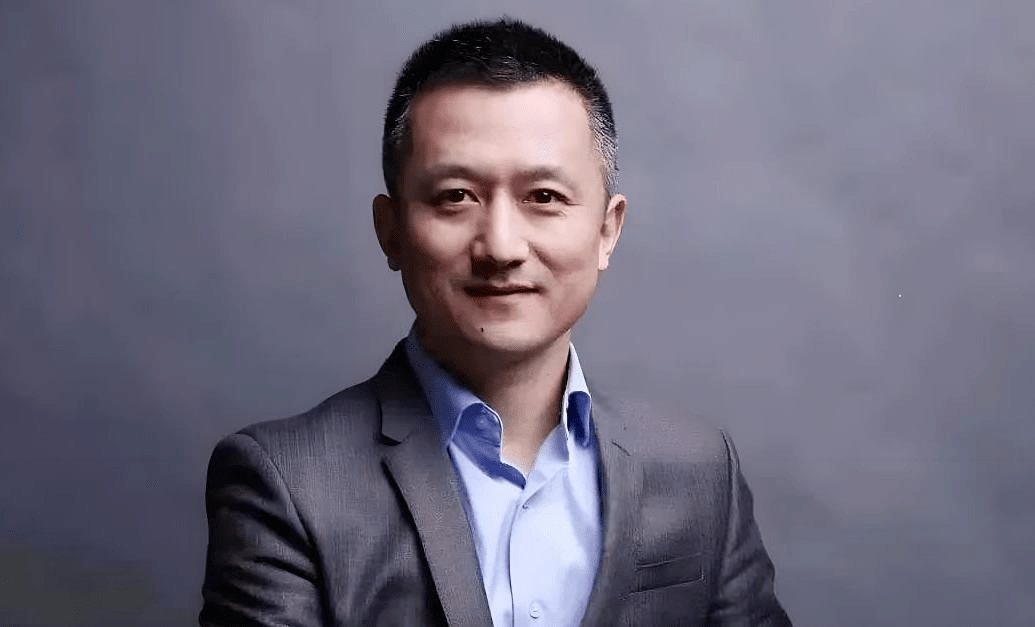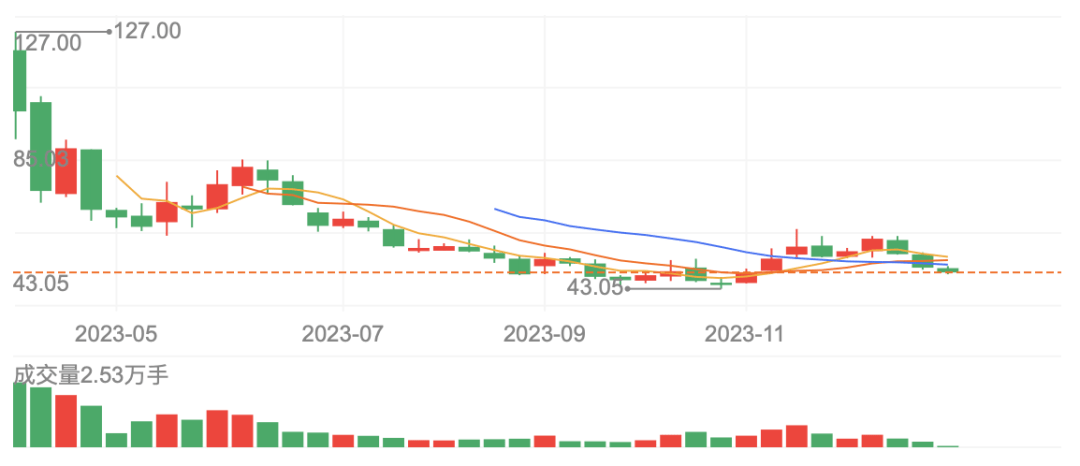

Before the rise of large models, the three killer applications of text recognition, speech recognition and image recognition appeared in the 1.0 era of artificial intelligence. In 2015, Shenzhen-based Yuntian Lifei launched a system called "Yuntian Shenmu", becoming the world's first dynamic portrait recognition system. In the past few years, "Yuntian Shenmu" has been widely used in the field of AI security and has successfully assisted the public security organs in solving tens of thousands of cases
In April 2023, Yuntian Lifei landed on the Science and Technology Innovation Board and quoted a high price of 121 yuan per share. In the collective bidding, it increased by 175.5% from the issue price, with a market value of more than 40 billion yuan, and it is on par with the "AI Four Little Dragons" "Comparable to one of Yuncong Technology. After listing, Yuntian Lifei released a dismal annual report, causing the stock price to plummet, down 60% from its highest point
Entering Artificial Intelligence 2.0, Yuntianli made a series of moves. While launching the AI inference chip DeepEdge10, it also released the "Book of Heaven" large model with hundreds of billions of parameters, launching a technological transformation. Facing giant competitors with annual revenue of only 500 million yuan, how can Yuntian Lifei break through?
Among domestic AI companies, losses have become the norm, while non-losses are the exception
From 2019 to 2022, Yuntian Lifei achieved revenue of 230 million yuan, 430 million yuan, 570 million yuan, and 550 million yuan respectively, and the corresponding net profits were -510 million yuan, -400 million yuan, and -390 million yuan respectively. yuan, -450 million yuan, and the net cash flows generated from operating activities were -190 million yuan, -240 million yuan, -180 million yuan, and -200 million yuan respectively.
In the first three quarters of 2023, Yuntian Lifei’s revenue reached 230 million yuan, a year-on-year decrease of 11.4%; net profit was -300 million yuan, a year-on-year increase of 11.8%. In less than five years, Yuntian Lifei has suffered huge losses, reaching 2 billion yuan, and since 2022, its revenue has been stuck in negative growth
One of the main reasons for the huge losses is that R&D expenses remain high. From 2019 to 2022, R&D expenses will be 200 million yuan, 220 million yuan, 300 million yuan, and 350 million yuan respectively, showing an increasing trend year by year. It is worth noting that although the company invested a lot of R&D funds, it did not bring about an increase in gross profit margin. On the contrary, the gross profit margin declined year by year. From 2019 to 2022, the gross profit margins are 43.6%, 35.6%, 38.8%, and 31.9% respectively. By the first three quarters of 2023, gross profit margin will increase slightly to 32.5%
For Chen Ning, co-founder, chairman and CEO of Yuntian Lifei, balancing the “blood loss” financial statements is undoubtedly a huge challenge

In terms of technology, Yuntian Lifei has built three major technology platforms: AI algorithm, AI chip, and big data processing. Among them, it has invested heavily in AI chips and promoted algorithm chipization as its main features.
Yuntian Lifei was established in 2014. There are two founders, one is Chen Ning, who holds 70% of the shares; the other is Tian Dihong, who holds 30% of the shares. Chen and Tian both graduated from the Georgia Institute of Technology in the United States and received doctorate degrees. After graduation, Chen Ning first worked at Freescale Semiconductor Company in the United States, and then served as IC technology director at ZTE Corporation. After the establishment of Yuntian Lifei, Chen and Tian had one "outside" person in charge of sales and one "inside person" in charge of research and development. They finally survived with the success of "Yuntian Shenmu".
However, Chen and Tian have huge differences in the future technical direction. Chen Ning, who has worked in the IC industry for a long time, believes that chips should take precedence over algorithms, while Tian Dihong holds the opposite view and believes that algorithms should take precedence over chips. The result of this technical dispute was that when Yuntian Lifei submitted its prospectus, Tian Dihong emptied his equity and exited the company, cashing out less than 35 million yuan. After Yuntian Lifei was listed, Chen Ning held about 25% of the shares, and its market value once exceeded 10 billion yuan
After Tian Dihong’s withdrawal, Yuntian Lifei increased investment and promoted the process of algorithm chipization, hoping to optimize AI technology by combining algorithms with chips. Under the leadership of Chen Ning, Yuntian Lifei has successively completed the research and development of third-generation instruction set architecture and fourth-generation neural network processor, trying to establish a technical barrier

Based on the algorithm chip, Yuntian Lifei combines hardware to form industry solutions and initiate commercialization. AI security is the first breakthrough. Since then, Yuntian Lifei has launched applications such as special vehicle supervision, intelligent prediction of traffic events, and urban grassroots governance for urban traffic scenarios. The prospectus shows that more than 80% of the revenue comes from the digital city operation and management segment.
In 2020, Yuntian Lifei released the "1 1 N" self-evolving urban intelligent agent strategy, aiming to build an intelligent and widely aware network for digital cities, as well as a self-learning and self-evolving urban super brain, and at the same time provide Smart applications empower multiple artificial intelligences. However, this strategy also faces two major challenges. One is the increasingly strict facial recognition control policies, and the other is the deep integration of artificial intelligence and industry
There is a hidden worry in the business model, that is, the revenue source brought by digital government is too single. In addition, the project-based engineering delivery has led to insufficient order reserves and declining gross profit margins. More importantly, facial recognition technology has long become an old technology, and various manufacturers are vying to enter the market, and competition is fierce. According to IDC data, the top five companies in the domestic computer vision industry are SenseTime, Megvii, Hikvision, Innovation Qizhi, and Yuncong, with their combined market share reaching 42%
Compared with its opponents, Yuntian Lifei has already fallen behind. Data shows that in the past two years, Yuntian Lifei’s market share is only about 1%. On the other hand, the gross profit margin of comparable companies in the industry is as high as over 50%, while Yuntian Lifei's gross profit margin hovers around 35%, which is difficult to compare with.
The only weapon for technology companies to break through is technology. After the rise of generative AI, Yuntian Lifei released a new generation of AI chips and launched a 100-billion-level "Book of Heaven" large model to launch a new round of technology research and development.
Yuntian Lifei has launched a new generation of AI chip DeepEdge10, which is equipped with the company's self-developed neural network processor NNP400T and can be widely used in AIoT edge video, mobile robots and other scenarios. Yuntian Lifei also relies on the DeepEdge10 chip and the company's self-developed innovative D2D chip architecture to launch the X5000 inference card, which can support the calculation of tens of billions of large models such as Llama2
The "Book of Heaven" large model with hundreds of billions of parameters includes three levels: general large model, industry large model, and scene large model. Specifically, it is based on the algorithm development platform and algorithm chip platform, and uses massive data to create a general large model; on the basis of the general large model, high-quality industry data is introduced to form an industry large model; the industry large model is fine-tuned through segmented scenario data , forming a large scene model.
In December, Yuntian Lifei said when receiving investor surveys that the "Tian Shu" large model has completed two version updates, and the next version will benchmark GPT-4 to further enhance multi-modal capabilities. The company disclosed that the "Tian Shu" large model has reached the industry's advanced level in general question and answer, language understanding, mathematical reasoning, text generation, role playing, etc., ranking first in the C-Eval Chinese large model list in early September.
At the time of listing, Yuntian Lifei raised a net amount of 3.58 billion yuan, 580 million yuan more than originally planned. With an AI chip in hand and a large model in hand, can Yuntian Lifei defeat the battle of hundreds of models? The industry will wait and see.
--Finish--
The above is the detailed content of Yuntian Lifei has suffered huge losses of 2 billion yuan for five consecutive years! AI chip investment adventure gambling. For more information, please follow other related articles on the PHP Chinese website!




